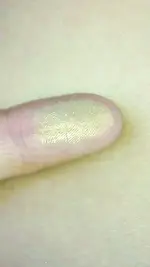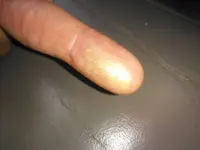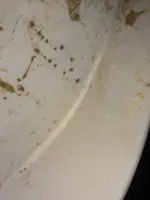My same comment holds - if "gold" is getting deposited in the sidewalk cracks, it'll be getting deposited all over the place, in every uneven and irregular surface that the water comes into contact with.
...So this is the Arkansas river in Arkansas?
Have you been able to distinguish that these deposits happen around the clock, or only during times of flooding? Is gold traveling only near the surface or throughout the width and depth of the river? I like mytimetoshine's idea of using a sheet (or something) covered with Vaseline - maybe several such sheets in different parts of the river to see where mineralization is concentrated. However, that wasn't your original question. You were originally thinking about working a sidewalk. Good place to start. Also, sounds like you now have a plan to work with. Might not be a bad idea, in addition to the little dustbuster, to have some sort of device that can blow puffs of air - like an ear wax removal bulb or a turkey baster. Dustbusters aren't super strong. Might not hurt to force a little air down there to help loosen the material so your dustbuster can suck it out.
Please don't think we're here trying to cut you down in any way. As near as I can read, every person that has commented has done so because 1) they don't want you to get stuck on a wild goose chase and 2) because there have been too many others in the past who have gotten "the fever", and been blind to everything including what's right in front of their eyes.
Arkansas state is not known for having much gold. There IS some, but not much. And if gold (being 19 times heavier than water) is being deposited in the cracks of a sidewalk, then where is this gold coming from? How far upstream? It's not coming all the way from Colorado!! So if you can verify that this is gold, then work upstream until you find the highest concentrations you can find. Once there, look around for where the gold is coming from - the source. If you can find a source, you'll be sitting on easy street in no time!
We'll help all we can. Just remember it's a 2-way street. You're there and we're not, so we may need a little something now and then in order to provide the best help we can. Right now we're going on a single pic of some gold-colored dust on your finger tip and your certainty that it IS, in fact, gold. Is more difficult for us. Seems like a find this huge would have been found already....but then, stranger things HAVE happened!











 This would be a process much more aligned with mercury. However, the LAST thing anyone should be doing is introducing more mercury to a river!! I just assumed this was something you had tried. Sounded weird to me, but hey, I really don't know everything. ...Honestly!
This would be a process much more aligned with mercury. However, the LAST thing anyone should be doing is introducing more mercury to a river!! I just assumed this was something you had tried. Sounded weird to me, but hey, I really don't know everything. ...Honestly! 

